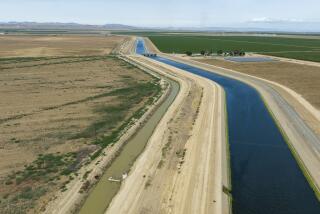Bush to Delay Plan for Oil Drilling and Leasing Off Calif.
- Share via
WASHINGTON — President Bush, in a major peace offering to environmentalists, will pledge in his nationally televised speech to Congress at 6 p.m. today to “indefinitely postpone” oil drilling off the Northern California coast and to delay a major lease sale planned for Southern California, a senior Administration aide said Wednesday.
The proposal, which environmental leaders hailed as a major victory, will all but kill the Ronald Reagan Administration’s long-stalled plan to greatly expand drilling in California waters. The plan, which for eight years has been fought by California officials in Congress and the courts, became a major issue during the fall presidential campaign. Democrats charged then that Bush, if elected, would allow drilling to proceed.
Bush, during the campaign, pledged to re-examine Reagan’s drilling plans. Since then “the jury has been out on this issue with Bush,” said Rep. Mel Levine (D-Santa Monica), a leading opponent of offshore drilling.
“I’ve always felt that Bush’s first test on the environment would be the California coastline,” Levine said. If Bush sticks to his plan to forestall the lease sales, “it would be a dramatic environmental victory,” he said.
Pledge on Acid Rain
In a second environmental decision, Bush will pledge in the speech to send Congress legislation to reduce acid rain emissions as part of a new clean air proposal. The pledge backs up a promise that William K. Reilly, Bush’s Environmental Protection Agency chief, made last week during his Senate confirmation hearings and could break a logjam that prevented significant modernization of clean air rules throughout Reagan’s tenure.
Administration sources cautioned, however, that Bush will not offer any new specifics on how to meet his clean air goals, leaving them open to further negotiations.
Under the Reagan Administration’s oil drilling plan, which was pushed by James G. Watt, Reagan’s controversial first Interior secretary, the federal government proposed two major new California oil lease sales, Lease Sale 91, off the northern coast, and Lease Sale 95, covering the coast south of Santa Barbara.
Under Bush’s plan, Lease Sale 91 would be “indefinitely postponed,” effectively killing the proposal. Lease Sale 95 would be delayed pending a report from a special task force that Bush will charge with developing plans to balance environmental and energy needs. While the task force approach in theory would allow the Southern California sale to proceed at some future time, “the language of the speech will indicate that he’s disposed against the drilling,” the Administration official said.
Under the Reagan plan, the government would have begun leasing tracts to oil companies in the Lease Sale 95 area next year. The sales were budgeted to bring in some $400 million in new federal revenue in the fiscal year that begins Oct. 1. Delaying or killing the plan will cause a “revenue hit,” the official said.
Would Fulfill Promise
But the money is of less importance to the new Administration than is the emotional symbolism of the decision. Bush, who spent three hours Wednesday afternoon in a relaxed review of his address to Congress, plans to use tonight’s speech to demonstrate his resolve to fulfill campaign promises, one of the most prominent of which was his pledge that “I am an environmentalist.”
Bush became the first President ever to pay an official visit to EPA headquarters Wednesday, attending Reilly’s swearing in ceremony and telling officials there that the American people “won’t accept excuses any more and they won’t accept finger-pointing. They want us to get all the sides together and find a way to achieve both” environmental protection and economic growth.
Watt and other Reagan Administration officials argued that more drilling was needed to reduce U.S. dependency on oil imports. Opponents have countered that the risks of oil spills, air pollution from drilling equipment and esthetic damage from the offshore rigs outweighed the benefits that increased oil production might bring.
Unlike many other major environmental issues, which require either substantial expenditures or extensive negotiations with Congress, the oil drilling issue can be largely resolved by executive fiat.
Congressional opponents of drilling--one of the most emotional environmental issues the federal government confronts--have fought a steady rear-guard action to delay Watt’s plan to vastly increase drilling in the Pacific off California, the Atlantic off New England and the Carolinas and off Alaskan shores. And California state officials have taken the federal government to court on several occasions claiming that drilling plans, if carried out, would violate a series of environmental laws.
More to Read
Sign up for Essential California
The most important California stories and recommendations in your inbox every morning.
You may occasionally receive promotional content from the Los Angeles Times.














